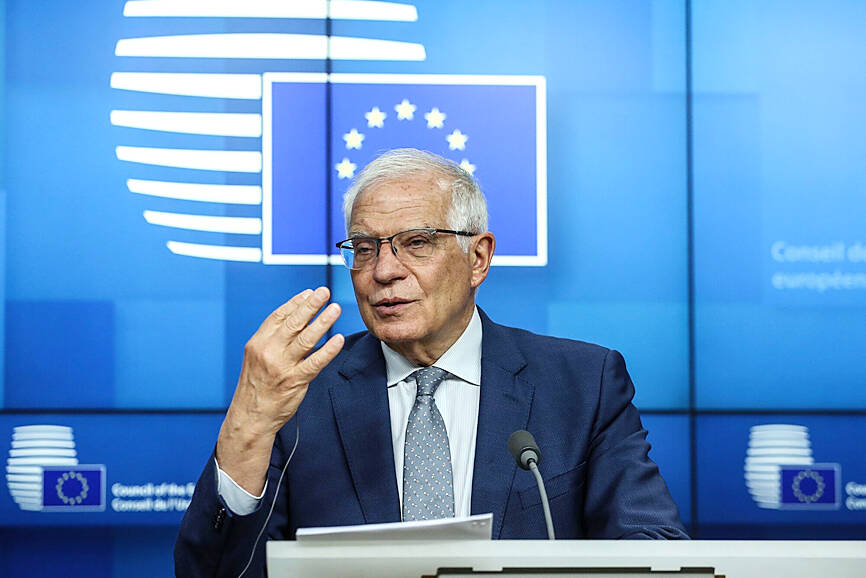EU High Representative for Foreign Affairs and Security Policy Josep Borrell called on European navies to patrol the Taiwan Strait, in an opinion article published in a French weekly yesterday.
Borrell’s comments in Le Journal du Dimanche echoed comments he made last week when he stressed how crucial Taiwan is to Europe.
He said that Taiwan “concerns us economically, commercially and technologically.”

Photo: Bloomberg
“That’s why I call on European navies to patrol the Taiwan Strait to show Europe’s commitment to freedom of navigation in this absolutely crucial area,” he added.
Two weeks ago, China launched three days of military exercises around Taiwan — simulating targeted strikes and a blockade of the nation — in response to a meeting between President Tsai Ing-wen (蔡英文) and US House of Representatives Speaker Kevin McCarthy.
On Tuesday, in a speech opening a debate on China at the European Parliament, Borrell talked about Taiwan’s importance to Europe.
“Taiwan is clearly part of our geostrategic perimeter to guarantee peace,” he said.
“It is not only for a moral reason that an action against Taiwan must necessarily be rejected. It is also because it would be, in economic terms, extremely serious for us, because Taiwan has a strategic role in the production of the most advanced semiconductors,” he said.
His comments came after French President Emmanuel Macron earlier this month argued that Europe should not be a “follower” of Washington or Beijing in the event of conflict with China over Taiwan.
Macron’s comments, following a visit to China, sparked criticism from some politicians in the US and inside the EU.
In Taipei, the Ministry of Foreign Affairs yesterday thanked the EU for repeatedly underlining the importance of peace and stability across the Taiwan Strait.
The EU shows that it values and supports Taiwan by opposing any unilateral change to the cross-strait “status quo” and stressing that Taiwan is crucial to Europe’s geostrategic interests for its role in the semiconductor supply chain and maintaining regional peace, the ministry said in a statement.
As a key member of the Indo-Pacific region, Taiwan will continue to deepen ties with like-minded democratic partners, enhance key supply chain resilience and safeguard regional peace, stability and prosperity, it added.
Additional reporting by Sally Liu

DAREDEVIL: Honnold said it had always been a dream of his to climb Taipei 101, while a Netflix producer said the skyscraper was ‘a real icon of this country’ US climber Alex Honnold yesterday took on Taiwan’s tallest building, becoming the first person to scale Taipei 101 without a rope, harness or safety net. Hundreds of spectators gathered at the base of the 101-story skyscraper to watch Honnold, 40, embark on his daredevil feat, which was also broadcast live on Netflix. Dressed in a red T-shirt and yellow custom-made climbing shoes, Honnold swiftly moved up the southeast face of the glass and steel building. At one point, he stepped onto a platform midway up to wave down at fans and onlookers who were taking photos. People watching from inside

A Vietnamese migrant worker yesterday won NT$12 million (US$379,627) on a Lunar New Year scratch card in Kaohsiung as part of Taiwan Lottery Co’s (台灣彩券) “NT$12 Million Grand Fortune” (1200萬大吉利) game. The man was the first top-prize winner of the new game launched on Jan. 6 to mark the Lunar New Year. Three Vietnamese migrant workers visited a Taiwan Lottery shop on Xinyue Street in Kaohsiung’s Gangshan District (崗山), a store representative said. The player bought multiple tickets and, after winning nothing, held the final lottery ticket in one hand and rubbed the store’s statue of the Maitreya Buddha’s belly with the other,

‘NATO-PLUS’: ‘Our strategic partners in the Indo-Pacific are facing increasing aggression by the Chinese Communist Party,’ US Representative Rob Wittman said The US House of Representatives on Monday released its version of the Consolidated Appropriations Act, which includes US$1.15 billion to support security cooperation with Taiwan. The omnibus act, covering US$1.2 trillion of spending, allocates US$1 billion for the Taiwan Security Cooperation Initiative, as well as US$150 million for the replacement of defense articles and reimbursement of defense services provided to Taiwan. The fund allocations were based on the US National Defense Authorization Act for fiscal 2026 that was passed by the US Congress last month and authorized up to US$1 billion to the US Defense Security Cooperation Agency in support of the

HIGH-TECH DEAL: Chipmakers that expand in the US would be able to import up to 2.5 times their new capacity with no extra tariffs during an approved construction period Taiwan aims to build a “democratic” high-tech supply chain with the US and form a strategic artificial intelligence (AI) partnership under the new tariffs deal it sealed with Washington last week, Taipei’s top negotiator in the talks said yesterday. US President Donald Trump has pushed Taiwan, a major producer of semiconductors which runs a large trade surplus with the US, to invest more in the US, specifically in chips that power AI. Under the terms of the long-negotiated deal, chipmakers such as Taiwan Semiconductor Manufacturing Co (TSMC, 台積電) that expand US production would incur a lower tariff on semiconductors or related manufacturing